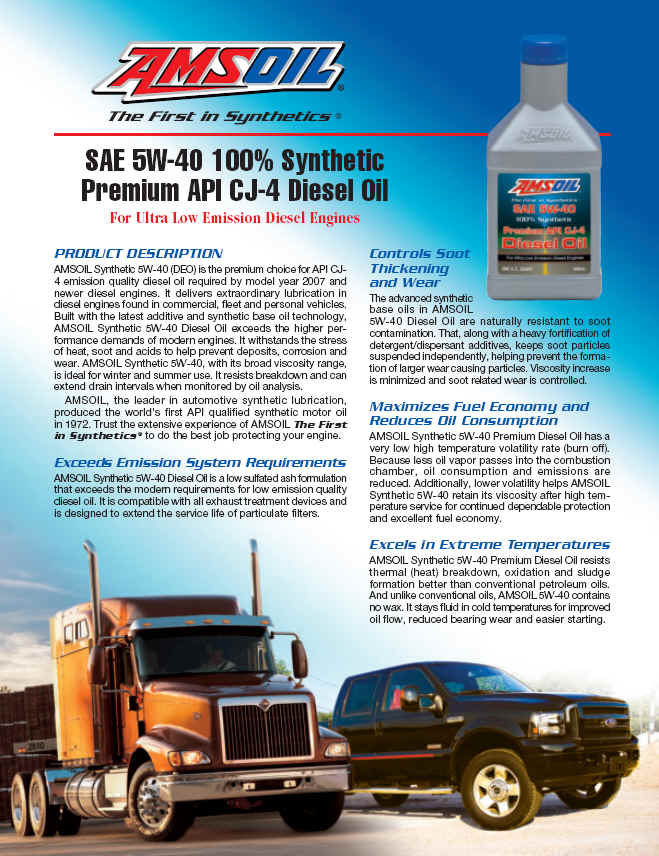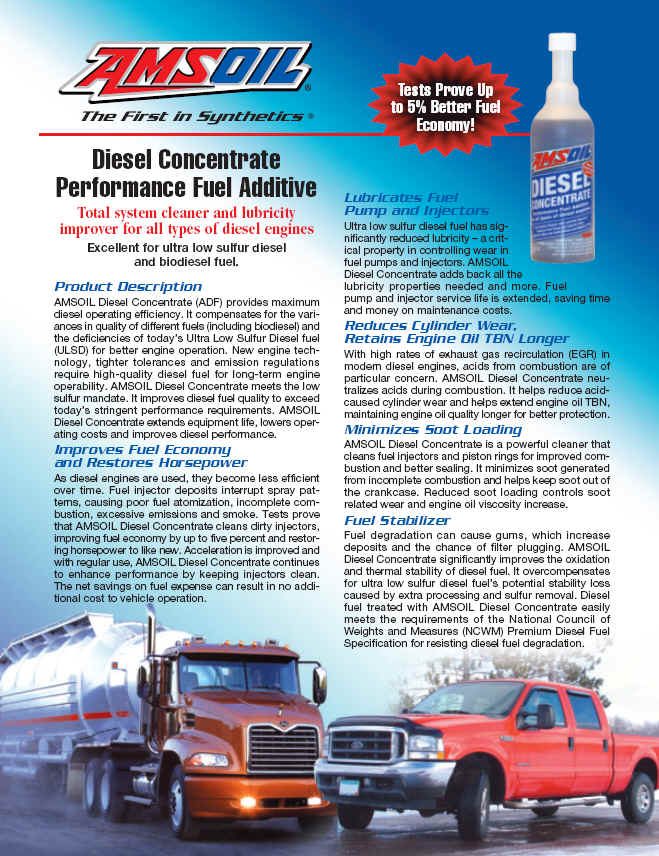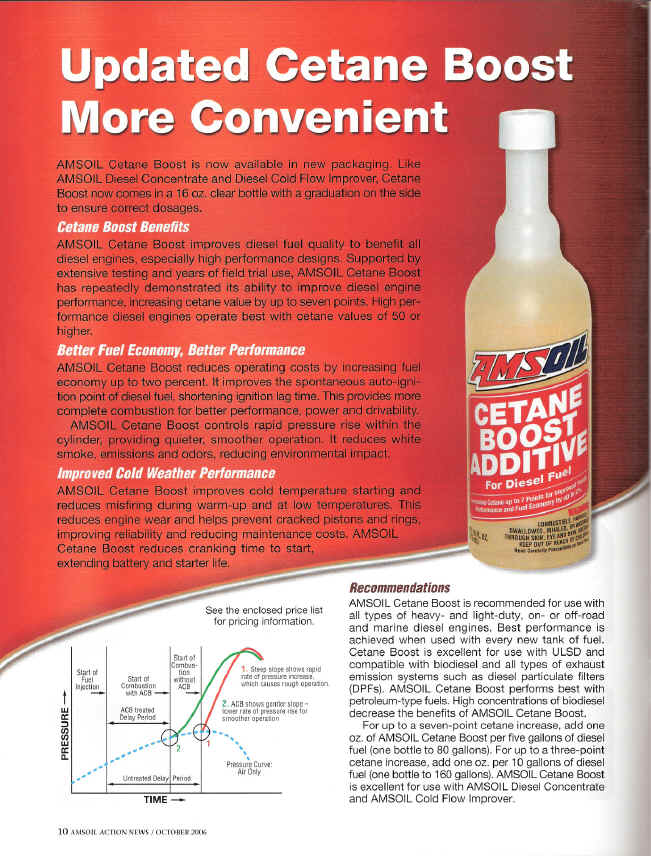Changes in the Diesel Market |
|||||||||
New Synthetic 5W-40 Premium Diesel Oil
Provides Superior Protection
|
|||||||||
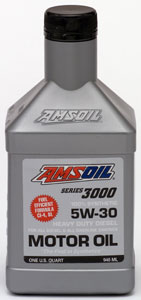 |
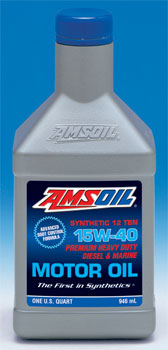 |
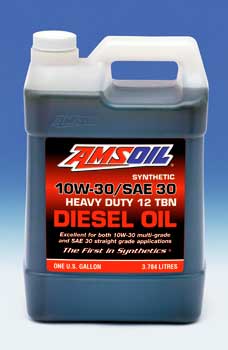 |
 |
2007 Emission Standards
Because low levels of EGR technology were successfully applied in diesel engines to meet 2002 NOx emission standards, most manufacturers have incorporated increased EGR rates of 25-35% in their engines to meet 2007 NOx emission standards. Increased EGR rates mean 2007 diesel engines run hotter than their predecessors, requiring diesel oils with improved oxidation resistance to prevent thermal runaway and maintain engine protection.
Further decreasing the level of sulfur in diesel fuel has been determined to be the most cost-effective way to decrease particulate emissions, The introduction of Ultra Low Sulfur Diesel (ULSD) fuel in June 2006 dropped diesel fuel sulfur levels from 500 ppm to 15 ppm in order to meet 2007 with NOx after-treatment and enable high EGR rates.
In addition, in order to further reduce particulate emissions, diesel particulate filter's (DPF's) have been incorporated into all 2007 American diesel engines, and diesel oils will be faced with the challenge of balancing engine protection with DPF life, Increased EGR, although effectively decreasing NOx emissions, results in less efficient combustion and increased levels of soot, and some of it finds its way into the engine oil Detergents and dispersants within the oil are responsible for preventing soot from accumulating on internal engine components and increasing friction and wear, as well as preventing soot particles from agglomerating into larger particles that increase oil viscosity and clog oil filters. Traditionally, detergent additives in diesel oils have effectively prevented acid buildup, corrosive wear, piston deposit formation and oil consumption, while an additive known as ZDDP has effectively provided wear protection for the valve train system, front gear ease, injector screws, push-rod ends and timing chains, as well as oxidation inhibition. The problem however, is that ZDDP and many detergents contain ingredients that plug diesel particulate filters, including sulfated ash, phosphorus and sulfur.
Due to the negative effects of sulfated ash, phosphorus and sulfur on diesel particulate filters, ASTM agreed to accept limitations in these areas and incorporate new additive chemistry for diesel oil category CJ-4. Sulfated ash provides lubricity and alkalinity (TBN) to counteract acid formation during combustion. While most API CI-4 PLUS oils are composed of 1.50 percent ash, new API CJ-4 diesel oils are limited to 1.0 percent ash, dropping TBN levels from 10 to 14 with average CI-4 PLUS oils to 8 to 9 with CJ-4 oils. Lower sulfated phosphorus and sulfur levels, as well as increased soot loading, affect an oil's ability to provide protection over extended drain intervals.
Synthetic 5W-40 Premium Diesel Oil
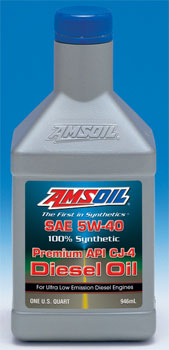 AMSOIL 5W-40
Premium Diesel Oil (DEO) is the premium choice diesel oil for model year
2007 and newer heavy-duty and pickup truck diesel engines requiring API
CJ-4 emission quality oil standards. It delivers extraordinary lubrication
in diesel engines found in commercial, fleet and personal vehicles.
Formulated with the latest additive technology and the most advanced
synthetic base oils, Synthetic 5W-40 Premium Diesel Oil exceeds the higher
performance demands of modern engines. It withstands the stress of heat,
soot and acids to help prevent deposits, corrosion and wear, and its
broad viscosity range offers superior protection over a wide temperature
range. Synthetic 5W-40 Premium Diesel Oil resists breakdown and is
recommended for the longest service interval established by the engine,
vehicle or equipment manufacturer. Drain intervals may be extended
when monitored by oil analysis. AMSOIL Synthetic 5W-40 Diesel Oil is a low
sulfated ash, phosphorus and sulfur formulation that meets and exceeds
modern
specifications for emission quality diesel oil. It is compatible with all
exhaust treatment devices and is designed to extend the service life of
particulate filters.
AMSOIL 5W-40
Premium Diesel Oil (DEO) is the premium choice diesel oil for model year
2007 and newer heavy-duty and pickup truck diesel engines requiring API
CJ-4 emission quality oil standards. It delivers extraordinary lubrication
in diesel engines found in commercial, fleet and personal vehicles.
Formulated with the latest additive technology and the most advanced
synthetic base oils, Synthetic 5W-40 Premium Diesel Oil exceeds the higher
performance demands of modern engines. It withstands the stress of heat,
soot and acids to help prevent deposits, corrosion and wear, and its
broad viscosity range offers superior protection over a wide temperature
range. Synthetic 5W-40 Premium Diesel Oil resists breakdown and is
recommended for the longest service interval established by the engine,
vehicle or equipment manufacturer. Drain intervals may be extended
when monitored by oil analysis. AMSOIL Synthetic 5W-40 Diesel Oil is a low
sulfated ash, phosphorus and sulfur formulation that meets and exceeds
modern
specifications for emission quality diesel oil. It is compatible with all
exhaust treatment devices and is designed to extend the service life of
particulate filters.
AMSOIL Synthetic 5W-40 Premium Diesel Oil replaces 5W-40, 10W-40 and 15W-40 viscosity oils. It is "backwards compatible" with pre-2007 diesel engines and recommended for newer and older diesel and gasoline engines and other applications requiring the following worldwide specifications:
• API CI-4+, CFI-4, Cf • API SM, SJ.., • ACEA E7 • Mack EO-O Premium Plus • DDC Power Guard 93K218 • Caterpillar ECF-3, ECF-1 • Cummins CES 20081 • Volvo VDS-4 • MB 228.3 • MTU Type II
Synthetic 5W-40 Premium Diesel Oil may be used in pre-2007 diesel engines, but for increased protection and performance for extended drain intervals, AMSOIL continues to recommend Synthetic Heavy Duty Diesel & Marine Motor Oil (AME), Series 3000 Synthetic 5W-30 Diesel Oil (HDD) or Synthetic 10W-30/SAE 30 Diesel Oil (ACD).
